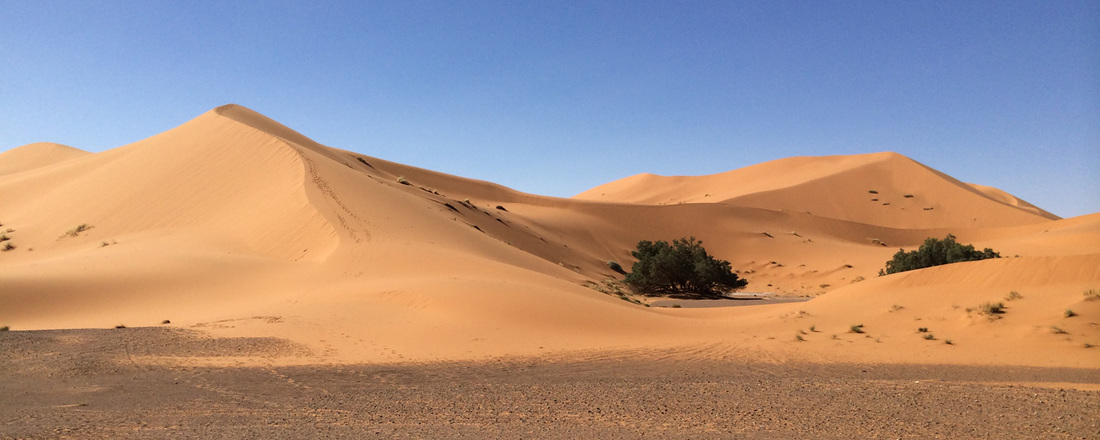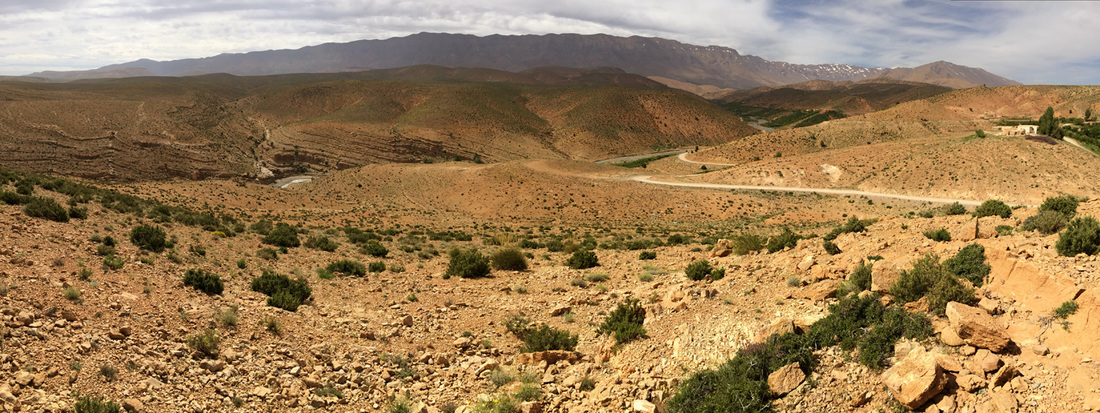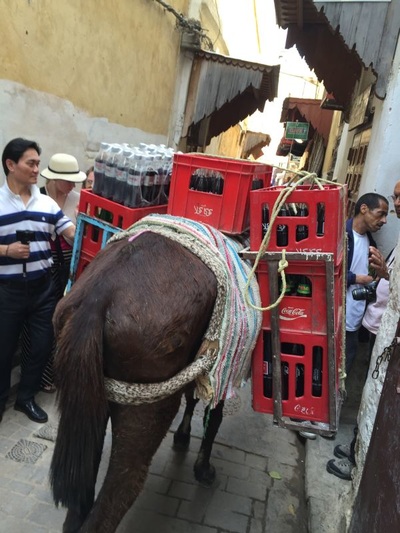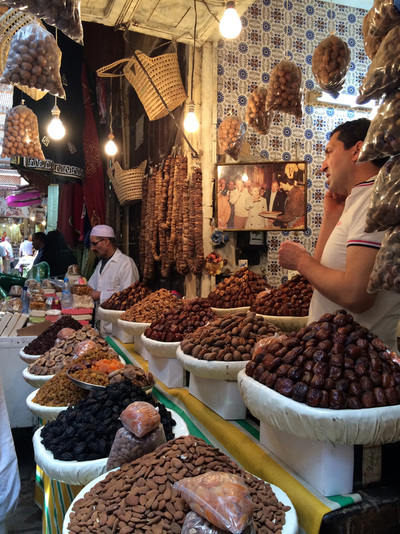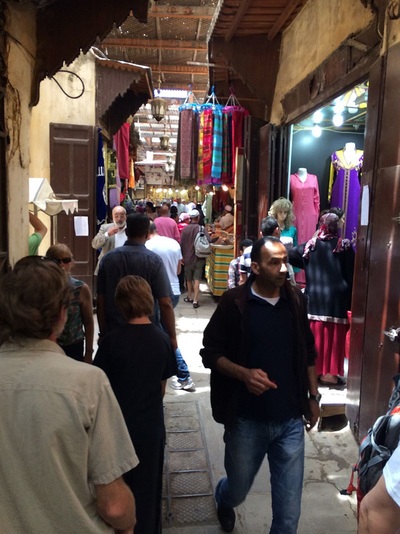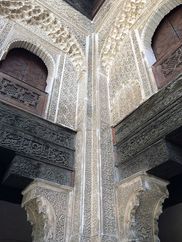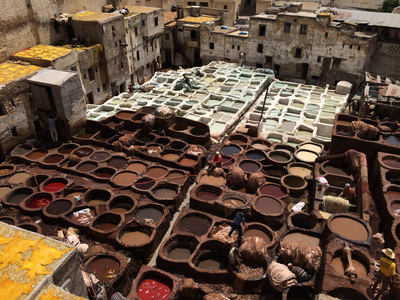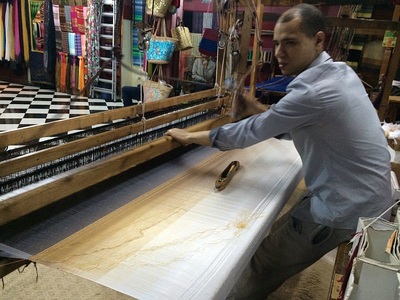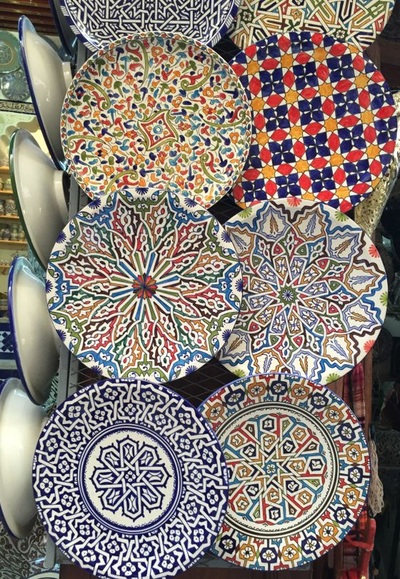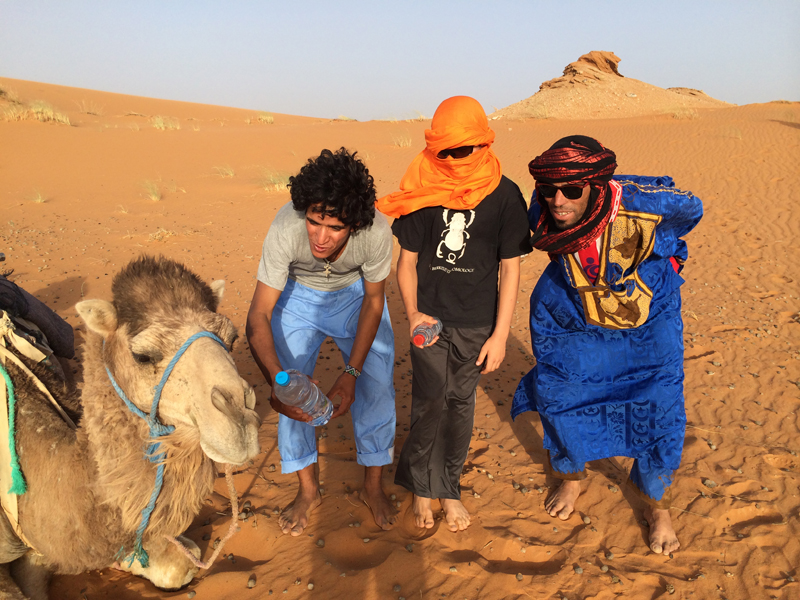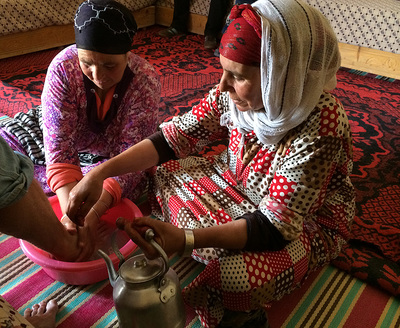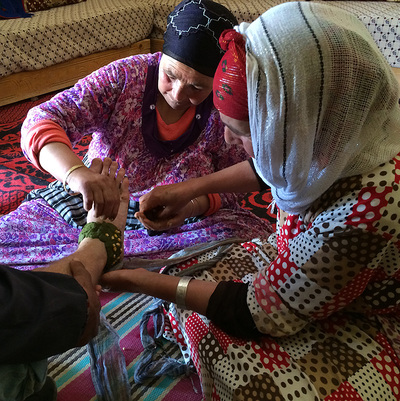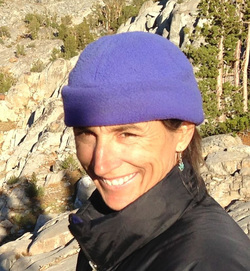OK, so I think of myself as self-reliant. Others have called me fiercely independent. I’m not one to routinely consider how much I depend on my husband, or friends, or on the people around me…
Here I am far, far away from home, in the Moroccan desert. It’s a place where the main languages spoken are languages I don’t even know – Moroccan, Berber, and French. It’s an extreme landscape, parched and rocky. The sun is relentless. The wind, penetrating. The people living here are working hard to get by. Customs are different, built on thousands of years of existence in a harsh land. No problem, I’ve been in foreign countries before, I’ve been in extreme conditions before. I can take care of myself. I’m comfortable-ish, relaxed-ish. I have this under control.
Until I don’t.
Here I am far, far away from home, in the Moroccan desert. It’s a place where the main languages spoken are languages I don’t even know – Moroccan, Berber, and French. It’s an extreme landscape, parched and rocky. The sun is relentless. The wind, penetrating. The people living here are working hard to get by. Customs are different, built on thousands of years of existence in a harsh land. No problem, I’ve been in foreign countries before, I’ve been in extreme conditions before. I can take care of myself. I’m comfortable-ish, relaxed-ish. I have this under control.
Until I don’t.
We were hiking along a bare, rocky ridge. The view of distant mountains and a nearby gorge was stark and spectacular. It was morning, but the sun was already burning. My 11-year-old son was collecting rocks, looking for fossils. My husband, Charlie, was taking pictures of small, desert flowers. I caught up to him and noticed he was grimacing with pain. He mumbled that he’d just turned his ankle. I looked down and saw a huge ball of inflammation growing above his foot. He swayed. Then he fainted. Charlie has never ever fainted.
That’s the moment I realized how independent I’m not.
Ж
Charlie, my son and I had landed in Casablanca, Morocco, and taken the train to Fes. Casablanca is a busy modern city — huge, noisy and lacking personality. But there we learned that city taxis are metered and fair; that nomatter how small a street is, it’s at least three lanes wide; that the “Call to Prayer” is broadcast live on loudspeakers over Moroccan cities even in the middle of the night; and that the Moroccan food – tagines, couscous, pastillas, kabobs – is amazing. On the train, we met our first Moroccans. We shared a train compartment with a family of five on their way to a wedding in Fes. They chattered in Moroccon, laughed a lot, yelled enthusiastically into their cell phones, offered us food, tried out their English with us, laughed some more. “Is this your first visit to Morocco? Welcome to Morocco,” they said. “Where are you from? America?! California?! We have a cousin in California.”
That was our first glimpse into Moroccan Heart… open to all, even strangers. Beautiful and giving.
Northern Morocco sped by the windows, not so different than southern Spain. Rolling limestone hills, covered in sparse vegetation, red poppies, and crops. Maybe the Mediterranean Sea hadn’t really split Spain and Morocco apart, maybe they were really just part of a larger whole.
Ж
Charlie was draped in my lap, leaning against me, unresponsive, his face white and covered in sweat. I talked softly to him, telling him everything he needed to hear, but my mind was starting to spin into worst case scenarios. I tried to control it. There is no moment but this moment. Breathe in. Medical facilities in this country? Hell, I hadn’t even seen an ice cube to reduce swelling. I hadn’t driven a car here. I hadn’t even changed money. Charlie had done it all. There is no moment but this moment. Breathe out. Right now Charlie needed shade and he needed water, and we needed to get him back to the car.
Cue the trumpets, and enter stage-left a tall, broad-shouldered Swiss hiker and his partner with water bottle and a hat. Herman, my patron saint, or Allah, whichever of you chose to look over me in this arid landscape, shukara, tan-mihrt, thank-you.
Ж
Fes… Our dar was just inside the medina. Asmae answered the door and welcomed us into the cool interior with a huge smile. The bustle of the medina fell away. She offered us mint tea and biscotti, and sat us in a courtyard. We were surrounded by carved white arches and intricate, colorful tilework. Beautiful wooden balconies rose a few stories above us, invitingly shady rooms with vibrant, soft cushions and lush rugs adjoined the courtyard. Asmae appeared again, “Please feel welcome. Our house is your house. Make yourself at home. Ask for anything you need. Use the kitchen, enjoy the roof terrace. I’ll show you your room. Let us know if you need a guide or a taxi.”
Moroccan Heart. Just that much more exposed.
Aziz was our guide in the Fes Medina, the ancient Fes urban center. Professional, he honored our wish to not shop, but to see the cultural heritage of the Medina. We stepped through the blue-tiled Medina gate into a maze of narrow, cobbled streets, bordered with shops, and humming with activity. People, bikes, and laden horses (like the Coca-cola “truck” below) passed in both directions.
Moroccan Heart. Just that much more exposed.
Aziz was our guide in the Fes Medina, the ancient Fes urban center. Professional, he honored our wish to not shop, but to see the cultural heritage of the Medina. We stepped through the blue-tiled Medina gate into a maze of narrow, cobbled streets, bordered with shops, and humming with activity. People, bikes, and laden horses (like the Coca-cola “truck” below) passed in both directions.
As we toured, Aziz shared the history of the city. Like southern Spain, the ancient history of this region included Phoenicians, Romans, and Byzantines. The region was conquered by Muslims in the 8th century. The Fes Medina, founded in the late 700’s, attracted Berber Arabs fleeing from uprisings in Spain, and Arab families avoiding conflict in Tunisia. The daughter of a rich Tunisian businessman used her wealth to found, in 859, what is now the oldest university (below) in the world. You go, girl!
Fes continued to grow and change over the next thousand years, borrowing the architecture and intricate Arabic carving and scrollwork designs from the Andalusians of southern Spain. You read that right, the architecture in Morocco came south from Spain, like we did. What we saw in the Alhambra is everywhere here. Fes still has a large artisan population, with people curing and dying leather, weaving beautiful fabrics from wool and agave “silk”, and painting intricate designs on ceramics.
The French took control of Morocco in 1912, explaining why French is the third language here, after Moroccan and Berber. Morocco didn’t regain her independence again until just sixty years ago. After a full morning, Aziz bid us adieu at a beautiful spot with a rooftop view across the Medina.
Ж
Ж
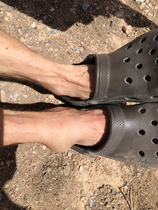
I found the Midelt hospital. I helped Charlie hobble slowly and painfully to the nearest door, which turned out not to be the entrance, but the most fortunate of mistakes. Two men inside jumped to their feet and helped Charlie get to the main hospital entrance. At the time we didn’t know it, but these two strangers were the Moroccan miracles that kept this day from unraveling into a nightmare. During the short walk, we established a common language – Spanish. They assured us the hospital couldn’t help us, but they knew of a healer, a woman, who was an expert at sprained ankles. She will use plants, she will pull on it, she will wrap it and it will be good in two days. They negotiated us into the doctor’s office and stayed with us while the doctor confirmed that yes, Charlie needed an x-ray, but no, unfortunately their machine was broken. Our new friends again recommended that Charlie see the healer women. Charlie, gaining more and more of himself back after the injury, thought he should get an x-ray in case his ankle was broken. His body’s reaction sure indicated something serious had happened. And even now his ankle was trying to imitate a baseball.
Sure, the men knew of a private doctor, so we all headed for the car. There was an awkward moment when one of the men asked for the car key. I was grateful to these men for their help. Without it I would be awash in that anxiety ridden combination of responsibility without local knowledge/authority. But I wasn’t ready to cede control completely. I politely shook my head, told him I would drive, and got in the driver’s seat. He blanched. I asked which direction to go, he regained his authority, and off we sped.
The private doctor indeed had an x-ray machine. But despite the needling and cajoling by our new friends, he wouldn’t see Charlie until he’d seen everyone else in line. That seemed fair to us, glad to know that’s how medicine was practiced in Morocco. The wait was long. The men stayed with us and chatted. Is this your first visit to Morocco? Welcome to Morocco! Where are you from? Ah, California, I have a friend in Los Angeles.
After over an hour, with more and more of Charlie’s personality poking through the stress of the injury, Charlie decided that knowing whether his ankle was broken wasn’t important. It was time to go to the healer. He was ready for an adventure.
Ж
The private doctor indeed had an x-ray machine. But despite the needling and cajoling by our new friends, he wouldn’t see Charlie until he’d seen everyone else in line. That seemed fair to us, glad to know that’s how medicine was practiced in Morocco. The wait was long. The men stayed with us and chatted. Is this your first visit to Morocco? Welcome to Morocco! Where are you from? Ah, California, I have a friend in Los Angeles.
After over an hour, with more and more of Charlie’s personality poking through the stress of the injury, Charlie decided that knowing whether his ankle was broken wasn’t important. It was time to go to the healer. He was ready for an adventure.
Ж
Early morning in the Sahara, the sun had just risen and we were playing in the golden dunes of the southern Morocco desert. The landscape of the dunes is sensual, carved by the wind into voluptuous curves. Tracks criss-crossed the sand. Here a dung beetle had wandered, there a fennec fox had trotted by, here a sandfish skink had buried itself, there a snake had sidewinded past. Even the wind had left ripples across the surface. There are no secrets in the desert, everything leaves prints. You know exactly where everyone has been.
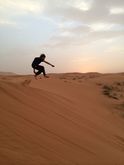
My son followed tracks for a while. Then he took running leaps from the tops of dunes. Then he buried himself in the sand.
We loved the soft feel of early sun, and the gentle playfulness of the warm morning breeze. We loved the sharp relief of the shadows at the bottom of our footprints.
When the sun rose enough to burn, we wandered back to camp. I picked up trash left by thoughtless tourists. Not too much, a water bottle here, a wrapper there, some wind-blown plastic bags, the ubiquitous Coke can.
We dropped off the dunes into camp, our home for two nights. It’s a Berber-style camp, in that it has woven rug-walled tents and a central fire ring. Unlike a Berber camp, however, it’s luxury in the desert. There are tents to sleep, dine, shower and relax in, there are tables scattered throughout the area.
We loved the soft feel of early sun, and the gentle playfulness of the warm morning breeze. We loved the sharp relief of the shadows at the bottom of our footprints.
When the sun rose enough to burn, we wandered back to camp. I picked up trash left by thoughtless tourists. Not too much, a water bottle here, a wrapper there, some wind-blown plastic bags, the ubiquitous Coke can.
We dropped off the dunes into camp, our home for two nights. It’s a Berber-style camp, in that it has woven rug-walled tents and a central fire ring. Unlike a Berber camp, however, it’s luxury in the desert. There are tents to sleep, dine, shower and relax in, there are tables scattered throughout the area.
At the heart of the camp were Karim, Moha and Otman, the three Berber men who made this place happen. Full of life, funny, gracious and beautiful, every day they gave so much of themselves to make us welcome and comfortable, while at the same time running the camp. I learned from an after-lunch conversation with Karim that he is a middle child with two younger siblings that he adores, younger even than my son. In the evening, if he has time, he finds the one spot above camp that has cell reception and calls them to talk. One evening, I saw the glow of his cell phone from a dune-top and my heart went out to him. In camp he jokes around, especially hamming it up for my boy. I’m playing the recorder… Karim starts to dance. I hit a wrong note… he falls over. My son erupts in laughter.
The first morning in camp, I saw Moha hobbling while working, and asked him why. He showed me the blue swelling around his toe, so like Charlie’s ankle. He laughed it off and asked me the English word for “sprain”, but he accepted my offer of ibuprofen. I learned a lot from Moha about Berber culture one night as we sat around the fire listening to Gnawa musicians, and that — like Karim — he is working far from his family. His home is in the Atlas Mountains.
Enormous Moroccan hearts, these men.
Ж
Enormous Moroccan hearts, these men.
Ж
Way in the back of Midelt, down a pitted dirt road, we stopped when the car couldn’t go further. Our troupe – three Americans, one struggling to walk, and two Moroccans – caught the attention of many. Seeing the need, a man stopped to help, aiding Charlie to hobble to the healer woman’s house. That made three generous men who came out of nowhere to help us complete strangers.
The healer lived in a brick/mud house, but the inside was cozy, covered in colorful wool carpets. There were cushions to sit on and even benches.
She and her partner, also a healer, looked at Charlie’s ankle, probed a bit (ouch), and told him it wasn’t broken. They boiled water, washed the ankle thoroughly, then made a henna poultice, which they packed around the ankle. Then they added dried corn.
The healer lived in a brick/mud house, but the inside was cozy, covered in colorful wool carpets. There were cushions to sit on and even benches.
She and her partner, also a healer, looked at Charlie’s ankle, probed a bit (ouch), and told him it wasn’t broken. They boiled water, washed the ankle thoroughly, then made a henna poultice, which they packed around the ankle. Then they added dried corn.
They wrapped it really tightly in small Moroccan scarves. Then, the healer straightened his foot, tugged on his toes, probed the swelling again, made him lay his leg sideways and then stepped on his ankle. In both directions. Ooo, I could tell from Charlie’s face that hurt.
She said, Loosen it after an hour if it’s too tight. Take the dressing off in a few days…
Ж
Berbers are known to be fiercely independent. Immersed in and thriving on the incredibly rich and diverse landscape of Morocco, they make their own choices. The Berbers’ own name for themselves, Amazigh, is derived from the symbol in the middle of the Berber Flag, the yaz Ж, meaning “free man”. On the flag, it’s red, their color for blood/life, and their color for resistance.
But fierce independence for Berbers includes strong dependencies as well. Strong ties to family, enough to call home every day from the nearest sand dune. Strong traditions of hospitality, which means reaching out to, welcoming, and aiding complete strangers like ourselves.
Ж
By the evening of the day Charlie visited the healers, he was already walking among the dunes. Every day afterwards, his ankle improved. By Marrakesh he wasn’t even limping. Perhaps the Moroccan miracles and the healers returned seamlessly to their lives, and perhaps the winds of the desert have already erased our tracks there. But the imprints of these people in our lives will last, indelibly. I learned alot about the importance of heart from our encounters with the people of Morocco, heart as a part of being strong, free and independent.
There is no doubt to me why Moroccans touch their heart with every greeting.
She said, Loosen it after an hour if it’s too tight. Take the dressing off in a few days…
Ж
Berbers are known to be fiercely independent. Immersed in and thriving on the incredibly rich and diverse landscape of Morocco, they make their own choices. The Berbers’ own name for themselves, Amazigh, is derived from the symbol in the middle of the Berber Flag, the yaz Ж, meaning “free man”. On the flag, it’s red, their color for blood/life, and their color for resistance.
But fierce independence for Berbers includes strong dependencies as well. Strong ties to family, enough to call home every day from the nearest sand dune. Strong traditions of hospitality, which means reaching out to, welcoming, and aiding complete strangers like ourselves.
Ж
By the evening of the day Charlie visited the healers, he was already walking among the dunes. Every day afterwards, his ankle improved. By Marrakesh he wasn’t even limping. Perhaps the Moroccan miracles and the healers returned seamlessly to their lives, and perhaps the winds of the desert have already erased our tracks there. But the imprints of these people in our lives will last, indelibly. I learned alot about the importance of heart from our encounters with the people of Morocco, heart as a part of being strong, free and independent.
There is no doubt to me why Moroccans touch their heart with every greeting.
